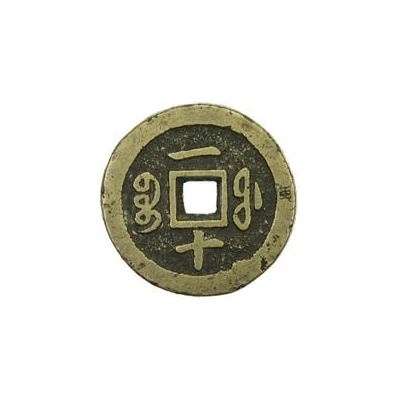10 Cash - Xianfeng Zhongbao; Boo-fu ND
| Brass | - | 32 mm |
| Issuer | Empire of China |
|---|---|
| Emperor | Qing dynasty › Xianfeng (咸豐帝) (1850-1861) |
| Type | Standard circulation coin |
| Years | 1853-1855 |
| Value | 10 Cash |
| Currency | Cash (621-1912) |
| Composition | Brass |
| Diameter | 32 mm |
| Shape | Round with a square hole |
| Technique | Cast |
| Orientation | Medal alignment ↑↑ |
| Demonetized | Yes |
| Updated | 2024-10-03 |
| Numista | N#225987 |
|---|---|
| Rarity index | 100% |
Reverse
Two Manchu words (read vertically) separated by the hole, all with one Chinese ideogram above and one below, and with four Chinese ideograms in each corner read right to bottom, left to bottom.
Scripts: Chinese (traditional, regular script), Mongolian / Manchu
Lettering:
五一計
ᠪᠣᠣ ᡶᡠ
錢十重
Translation:
Ji Zhong Wu Qian / Yi Shi / Boo-fu
Calculated weight 5 Qian / 10 Cash / Boo-fu
Edge
Plain
Interesting fact
One interesting fact about the Standard circulation coin 10 Cash - Xianfeng (Zhongbao; Boo-fu) ND (1853-1855) from Empire of China made of Brass is that it was designed by a French engraver named Jean-Antoine Raux, who was hired by the Chinese government to modernize their currency. This coin was part of a series of coins introduced during the Xianfeng era (1850-1861) that were designed to replace the traditional Chinese cash coins, which were cast in bronze and had been in use for centuries. The use of brass for this coin was a significant departure from traditional Chinese coinage, which had always been made of bronze or other base metals. The introduction of this coin and others like it marked an important step towards the modernization of China's currency and economy.

